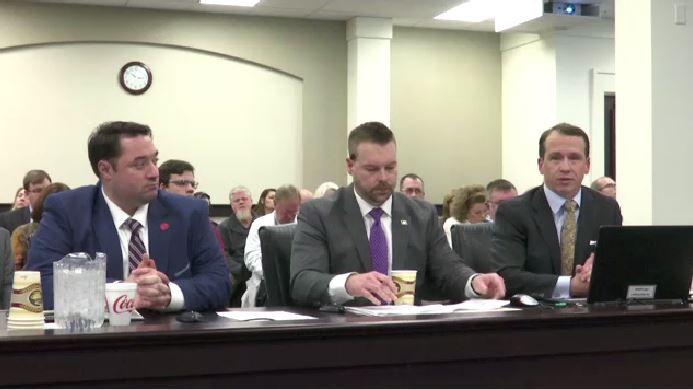FRANKFORT- Pharmacy benefit managers (PBM's) and Medicaid managed care organizations (MCO's) were under scrutiny at a Medicaid Oversight and Advisory Committee Tuesday.
How well pharmacy benefit managers are complying with a new law was up first.
Officials from the Cabinet for Health and Family Services presented the changes that PBM's reported since Senate Bill 5 went into effect.
Senate Bill 5, passed during the 2018 session, intended to ensure that independent pharmacists were fairly reimbursed by PBM's for filling Medicaid prescriptions. Prior to the bill, PBM's were setting the reimbursement rate; meaning many pharmacies were getting reimbursed far less than the national average. The PBM's are hired by one of the five Medicaid managed-care organizations in the state.
The cabinet says it will still be a few weeks until a complete trend list is ready to be released to lawmakers, in part because of the complexity of the issue.
"This data has not been historically collected, either in Kentucky, or really anywhere in the nation. Even if we were absolutely confident, 100 percent, in the quality of the data we were collecting, we have no context for it..." explained Brandon Smith, Executive Director, Office of Legislative and Regulatory Affairs for the Cabinet of Health and Family Services. "So we can't tell if Kentucky is doing better or worse than the average state."
Lawmakers were critical of the slow data gathering. Sen. Ralph Alvarado, R-Winchester, expressed his frustration with PBM's and MCO's for taking eight months to compile information showing if these companies are paying less to smaller pharmacies in the state.
"That's what frustrating, is we are contracting with these MCO's that should be transparent in how they are handling these funds," he said. "It's been eight months and we still don't have those answers, it's a basic answer I would think. It's something I think they could very easily provide us."
Sen. Stephen Meredith, R-Leitchfield, was also critical of the time, accusing the agencies of not having a sense of urgency.
"I think there needs to be a greater sense of urgency because we have such a divergent opinion as to where we are with this thing," he said. "From the Senate's perspective, we think there is half a billion dollars here that's unaccounted for that's going to help fund the Medicaid program. But, on your-all's side, there is as much as a $250 million shortfall this year. So that is going to hobble us for making a decision with the program going forward."
But--CHFS rejected this claim.
"If the question is whether the cabinet has a sense of urgency with this issue, the answer is yes, of course we do," said Smith. "It's an important issue, it involves a lot of money. It involves a number of providers who are providing specific and necessary services to hundreds of thousands, if not more, Kentuckians on a daily basis. So yeah, we are very understanding and sensitive of the fact this is affecting a number of people."
The profit margins of MCO's in Kentucky was also discussed during the committee meeting. In 2015, MCO's profit margin was at 11.3 percent, the highest in the nation; with the national average profit margin at just 2.6 percent. The high profitability was causing the state's Medicaid system to fall behind on payments. After making changes to the rates, and ways the MCO's report and keep track of data, the profit margin went down to around three percent for 2017. While an improvement--the national average also lowered to .9 percent.
Changes were also made to the medical loss ratio (MLR) to improve cost efficiency for the state. Beginning in 2017, MCO's were required to meet a medical loss ratio of 90 percent. Meaning 90 cents of every dollar they receive must go toward benefits.
"Kentucky is the most aggressive in the nation on the minimum MLR," said Steve Bechtel, Chief Finanical Officer, Department of Medicaid Services, CHFS. "Most other states are around 85-88 percent."
A new Request for Proposal (RFP) for MCO contracts was scheduled to be drafted and go into effect July 1, 2019--but the Department for Medicaid Services decided to delay that process in order to make the contract more beneficial for the state.
"We wanted to have time to strengthen the contract, to strengthen the RFP, so when we got the responses they were addressing the things that are weaknesses," said Carol Steckel, Commissioner, Department for Medicaid Services. "Kentucky is new in managed care so we are trying to learn from our own experiences in the commonwealth but also the experiences of other states that have had managed care for a longer time."
Making sure the process was transparent across the board, not just when it came to dealing with PBM's, was another reason for delaying the process.
Sen. Meredith filed legislation last session to bring the number of MCO's down from five to three. He asked Commisisoner Steckel if that's something that could work in the state. Which she responded that was something they were considering.
The final panel of the meeting were hospitals who used their time to air their grievances with problems they experience with MCO's. Many of the concerns hospitals had were with MCO's denying payments of certain services.
MCO's will be given a chance to testify against the claims made during the next committee meeting Dec. 12.



